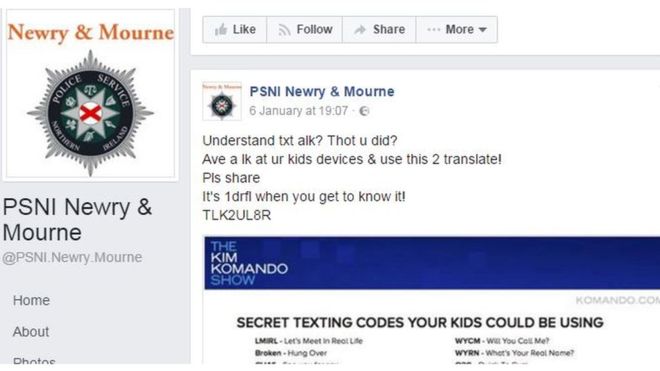PSNI sends out `reality` message to warn parents over teenage text message codes
A force has defended posting a graphic `texting` code which could be used by young people to disguise their phone or online conversations.
A force has defended posting a graphic `texting` code which could be used by young people to disguise their phone or online conversations. Police Service of Northern Ireland (PSNI) officers in Newry and Mourne posted the code on its Facebook page at the weekend. With the numerous online chat methods currently available such as Facebook, Snapchat, Instagram and Whatsapp officers said it was important for parents to be aware of the language being used by their children. While Friday`s (January 6) post was met with scepticism by some Facebook users, the PSNI said it is not an exhaustive list and that it is something that parents should be aware of. Some of the posts are relatively straightforward such as HAK, meaning hugs and kisses or WYCM for `Will you call me` however others are of a more obscene sexual nature and indicate a degree of keeping the conversation secret. Such as, MOS Mom over shoulder, PAW parents are watching, PIR parents in room. Officers later clarified that it was a US resource from a list published by an American technology show and that while not all codes may be used in Northern Ireland “prevention is better than cure”. It said: “As a follow up to the text talk post just to clarify that this was an American resource and indeed some of the codes may not be being used here but it is something to be aware of if you see cryptic messages on your kids devices. “Also prevention is better than cure so speak to your kids about their online activity, what they are using and respect the age limits of social media platforms is it proper to set up a kid with a Facebook account at 8 years old? What is an appropriate age to give your child a smart phone / device and data / wifi access? “There are hundreds of text talk codes a simple online search will reveal what any codes you spot actually mean.” Detective Superintendent George Clarke told BBC Good Morning Ulster that some of the more graphic messages were a “reality”. He said: “Parents must be involved in their children`s lives online and well as offline. “You wouldn`t allow children to go off in a car with people you don`t know, so let`s be careful about who they`re interacting with online.” NSPCC Northern Irelands campaigns manager, Margaret Gallagher, said it is important that young people and their parents have agreed rules on what is acceptable online. Ms Gallagher told the Belfast Telegraph: “Teenagers will always want to create coded language that can`t be understood by their parents it`s natural and not necessarily something to get overly concerned about. The key thing for parents to keep their children safe online is to talk about staying safe and agreeing rules together about whats ok and what isnt. Communication and building trust with your child is the most important thing. The web can be a fantastic place for children and young people to socialise, explore their interests, and learn, but every parent buying an internet device should be aware that there are risks, too and think about installing parental controls. The NSPCC has lots of resources to help parents talk about online issues so that they can help keep a child safe and happy online. Children also need reassurance that, if things do go wrong, they have someone they can turn to. FACTFILE: guide to secret texting codes WYRN: What`s your real name? HAK: Hugs and kisses ASL: Age, sex and location WTTP: Want to trade pictures? 53X: Sex CU46: See you for sex NIFOC: Naked in front of computer PAL: Parents are listening KPC: Keeping parents clueless PRON: Porn ZERG: To gang up on someone RU/18: Are you over 18? Broken: Hungover LMIRL: Let`s meet in real life


